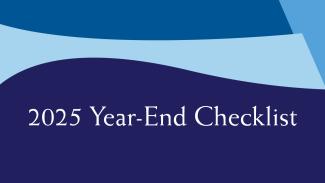
2025 Year-End Checklist
A year-end financial checklist provides a framework for reflection. What has changed in the past year?
This checklist helps you review changes in your personal and financial life and take advantage of opportunities to reduce tax liability.
1. FINANCIAL PLANNING
- Where did your money go this year? (Home improvements, education, gifts, travel etc.)
- What goals did you accomplish?
- What are your goals for the New Year?
- What life changes should be factored in to your plan? (Marriage, divorce, births, death, retirement etc.)
- Review your financial plan with your advisor.
2. INVESTMENT REVIEW
- Meet with your advisor to review asset allocation and risk tolerance.
- Review contributions to your Traditional and Roth IRAs. The 2025 maximum contribution is $7000. If you're 50+ you can contribute an additional $1,000.
- Review taxable events from the year, including capital gains and losses realized in 2025.
- Ensure tax diversification across accounts.
- If you're contributing to a 529 plan, review the tax benefits in your state.
- Contribute to your IRA. Contributions may be tax-deductible, reducing your adjusted gross income (AGI). You can make a contribution for the current tax year up to the tax filing deadline of the following year.
- Discuss a "back-door" Roth IRA strategy with your advisor.
3. TAX PLANNING
- Update your tax withholding to reflect any changes in the past year (divorces, marriage, retirement, death etc.)
- Time your income and deductions for next year's anticipated income, and consider deferring or accelerating bonuses, property sales, gifts, and other taxable transactions.
- Explore tax loss harvesting, which can help reduce your tax liability.
- Review your tax savings options and plan with your advisor and CPA.
4. EMPLOYEE BENEFITS
- Review contributions to your employer-sponsored 401(k)
- For the 2025 tax year, the maximum 401(k) contribution is $23,500. Employees aged 20-59 and those 64 and older are eligible for a standard catch-up contribution of $7,500. New in 2025 is a special catch-up contribution of $11,250 for employees age 60-63.
- If you're not at the max, try to contribute the company match.
- Review your asset allocation to make sure it's aligned with your risk tolerance.
- Don't forget about other benefits like stock options, incentive plans, health, life, disability insurance and FSA. Use up your FSA before it expires!
- Check the status of your HSA contributions. For the 2025 tax year, the maximum contributions are $4,300 for individuals and $8,550 for families. Individuals age 55 and over can contribute an extra $1,000.
- Review beneficiaries and contingent beneficiaries.
5. CHARITABLE CONTRIBUTIONS
- Review the donations you've made in 2025 including appreciated assets.
- If you're 70.5 or older, consider qualified charitable distributions (QCD) from an IRA. The maximum QCD in 2025 is $108,000.
- Donate appreciated assets if you have long-term capital gains. Donating the assets means you won't have to pay capital gains tax.
- Meet with your CPA and Advisor to review giving options including Donor Advised Funds.
- Consider deductibility changes from "OBBBA" in 2026, for charitable contributions.
6. ESTATE PLANNING
- Update your will, trust, POAs and healthcare directives after major life events or at least every five years.
- Review beneficiaries and trustee and executor designations.
- Consider naming a corporate trustee or co-trustee for trust administration, reach out to your advisor to discuss how we can help.
- Review gifting. In 2025 monetary gifts up to $19,000 are federal tax free. As of 2025, the lifetime gifting exemption is $13.99 million per individual.
7. CREDIT AND DEBT
- Review the balances for all credit cards, mortgages, auto and student loans, and HELOCs and compare interest rates and terms of refinance.
- Prioritize paying off high-interest debt to reduce the amount of interest you will pay.
8. INSURANCE
- Review policies and coverage amounts including life, disability, long-term care, homeowners, auto and umbrella insurance. Does your coverage still meet your current needs?
- Verify insurance beneficiaries.
We are here to help! Please contact our team with any questions you may have.

